February 2024: Two Years of War
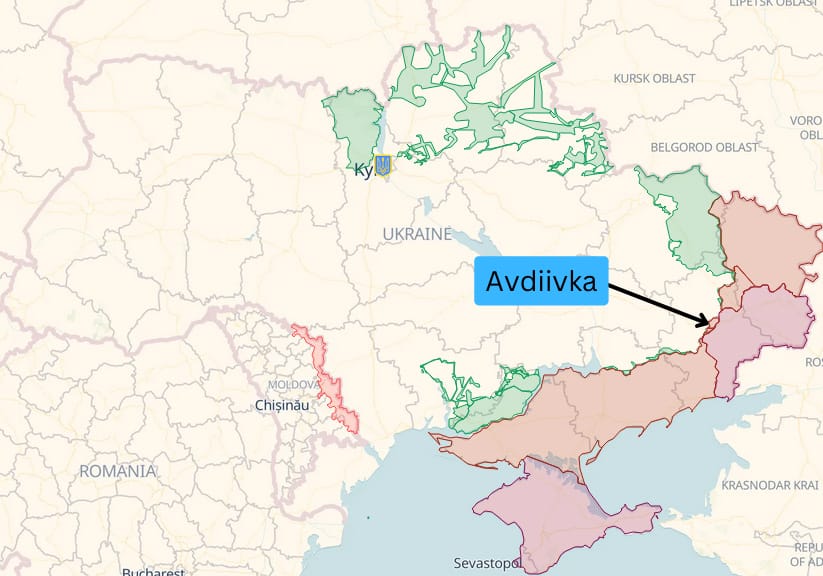
On this day, two years ago, Russia started its full scale invasion of Ukraine. Every Ukrainian will remember for the rest of their lives the exact moment when they heard that war had broken out: A student in her pajamas walking into their dormitory and waking them up in the middle of the night. Or a phone call from their grandmother at 4 am, while their girlfriend was sleeping in the next room.
This day changed the lives of millions. And it continues to do so, as the war drags on two years later and shows no sign of stopping. So, let's get an overview of where things stand.
The Front
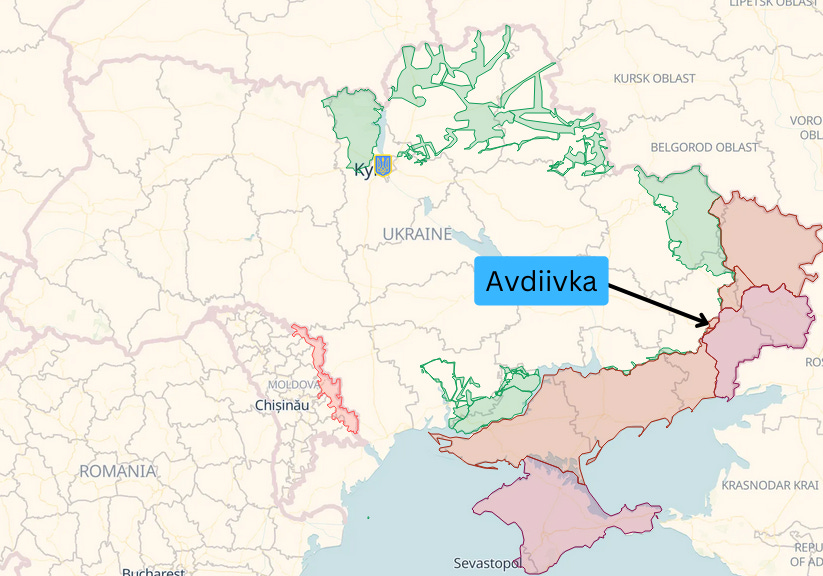
The Ukrainian frontline town Avdiivka has fallen. Russia began its attack last in October, at first failing to encircle the town and sustaining heavy losses. However, Russian forces kept pressing on the city, trying to score a win with primarily symbolic value for Putin's upcoming re-election in March. They threw human waves of professional soldiers at the poorly fortified Ukrainians positions. The defenders desperately tried to hold their ground against an enemy pounding them with artillery. Being starved of ammunition, the Ukrainian soldiers could only shoot about 10% as many shells as the Russians.
Russia probably gained partial air superiority and was able to bomb the Ukrainians with their jets. Ukraine's new top general announced the withdrawal from Avdivka on February 17. An elite brigade was pulled from the reserve and sent in to cover the fighters’ exit from a closing pocket in which they risked to get trapped. They used precious air defense missiles - which might run out in March - to shoot down three Russian jets, but got swarmed with small and quick drones that would explode on them. Accounts differ on how many men were lost, but some soldiers were confirmed captured. The New York Times has reported that hundreds were trapped, but I’m not yet aware of visual evidence supporting this claim. However, videos emerged, showing what are believed to be Russian soldiers executing wounded Ukrainian soldiers they had promised to take as prisoners. Some experts have criticized the withdrawal as too late and poorly executed.
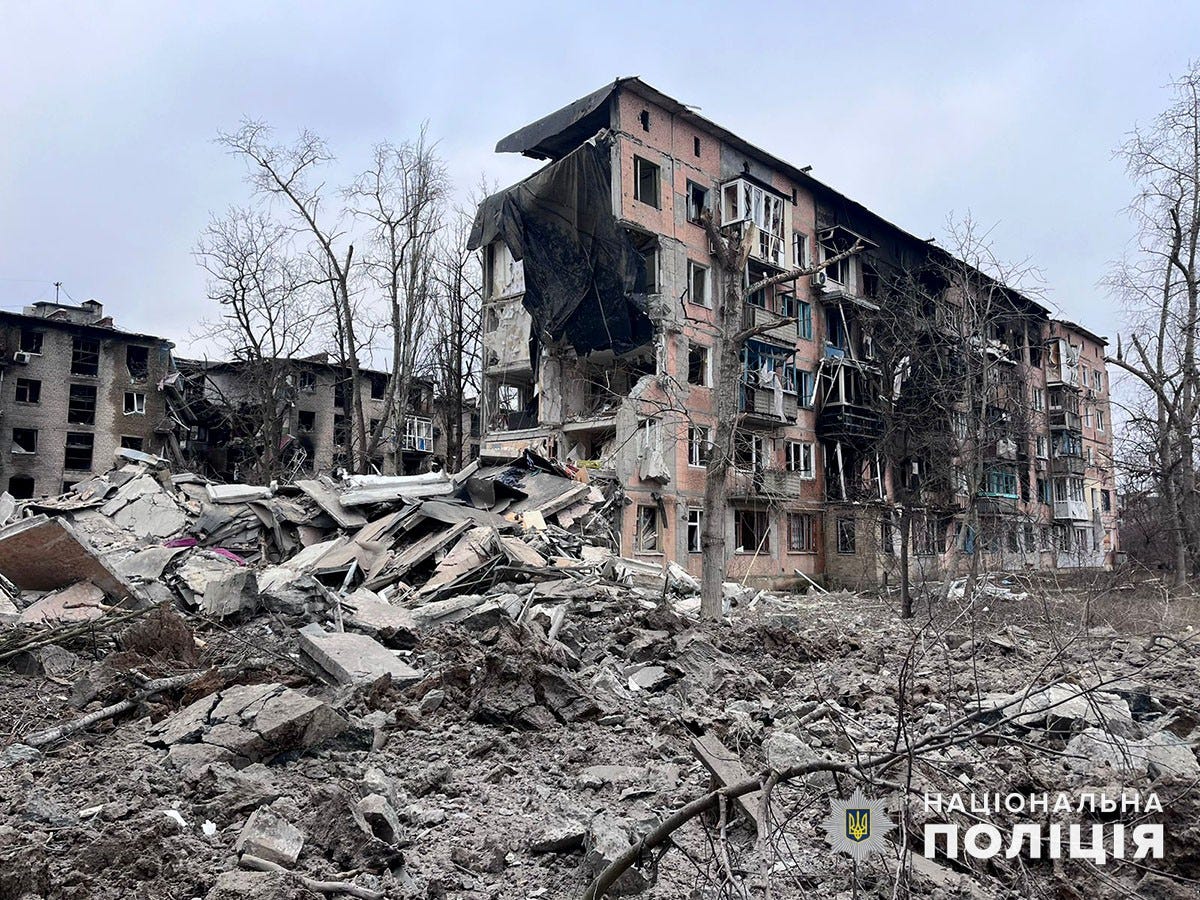
Ukraine is struggling
Since at least the beginning of 2024, Ukraine stands on shaky grounds. Its army has taken heavy losses in its 2023 counteroffensive, which failed to achieve minimal goals. Now, the stream of aid being sent to Ukraine has massively shrunk, mainly because in the US, which is Ukraine’s biggest supplier, right-wing Republicans are blocking more military aid. European countries pledged some more aid, trying to plug some of the holes left by the Americans. Denmark donated its whole (quite limited) artillery. That's not something you do if you're not extremely worried about what might happen if Ukraine loses the war. Yet a lot of already pledged support still has to manifest. Europe's defense industry is seriously lagging behind, delivering only half of the million shells that had been promised to arrive by March.
Ukraine has ramped up its own weapons production, but has mainly focused on DIY drones which were party able to replace sparse artillery shells and have vastly changed the battlefield. The overwhelming majority of those drones were crowdfunded through social media, produced in garages and sent directly to frontline units by volunteers from civil society. Actually, one of these campaigns just broke a record by raising $7.8 million for "Sea Baby" drones in 36 hours.
Russia is doing alright
Meanwhile, Russia is doing pretty well. Defying expectations, its economy is growing. Sanctions are constantly being bypassed, with border guards too few to properly enforce them, and Russia finding creative ways to smuggle in Western goods. The prices for Western components needed for missile production only rose by about 30%.
Russia's war economy has kicked into gear, to the point where it might be able to replace all the losses its army will sustain by staying on the offensive throughout 2024.
Russia’s factories are not building a lot of new tanks, etc., but instead taking old ones out of storage and trying to make them fit for battle again. Russia can do this for a really long time, since it inherited most of the old Soviet Union’s massive stock of military machinery.
Additionally, Russia is buying ballistic missiles from North Korea and Iran (according to Reuters).
Also, its army has been able to recruit enough soldiers to replace its losses without further waves of conscription. Putin’s war has created tons of well-paying jobs, giving hundreds of thousands of untrained workers the opportunity to ascend to the middle class.
In the long term, this certainly looks like an economy that’s bound to encounter serious problems. But Putin places an emphasis on having his economy managed by smart technocrats, and it might take years until those problems start hindering the war effort.
Additionally, the Russian army is not the disorganized mess it was two years ago. It is still sustaining disproportionately high losses, but it has learned from the grave mistakes it initially made, conducting more coordinated offensives. Taking all the territory Russia claims for itself is still a long way off, and even further off is its goal to occupy all of Ukraine or install a puppet government. But there now seems to be more coherent planning and the willingness to fight for long-term goals.
Therefore, Ukraine needs to defend smartly and work miracles with the very few artillery shells and air defense missiles it has. It can afford precious few mistakes, and launching a counter-offensive doesn’t seem realistic until next year.
There is another big issue Ukraine has to deal with: a lack of manpower. But before we get into that, let's take a look at some other events surrounding the conflict:
Hey, I hope you’re learning something new :) Please share this post with others to help grow this publication.
Polish Farmers are blocking the border
A number of Polish-Ukrainian border crossings are currently being blocked by Polish farmers protesting cheap Ukrainian grain entering their market and driving prices down. Since the beginning of Russia’s invasion, a lot of Ukrainian grain has had to be exported through Poland, with the Black Sea having become a very dangerous route. This issue first flared up last autumn, when Poland banned Ukrainian grain from being sold in the country. Protesters have announced they're going to keep their blockade up until April, and they might even prevent buses from entering the country.
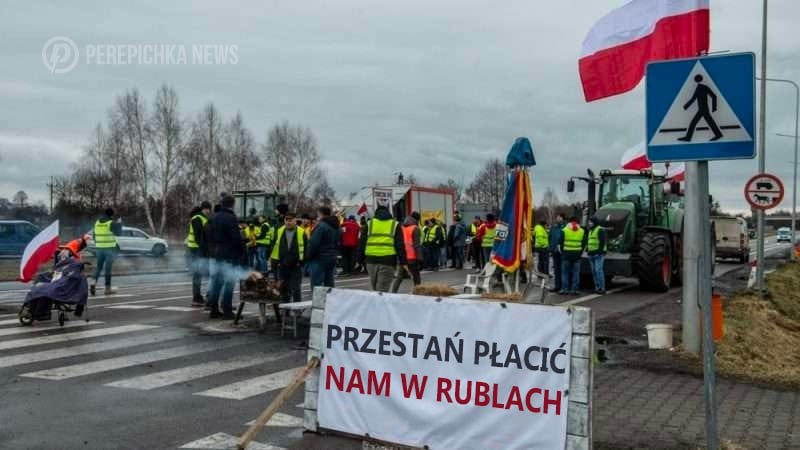
For the following reasons, this situation has the potential to get quite complicated for the Polish government, an important ally to Ukraine:
- most ways to enter Ukraine lead through Poland by car, bus or train (Ukraine’s airspace being closed)
- there are a lot of Ukrainians living in Poland
- there have been multiple instances of protesters adopting very pro-Russian stances
- there have already been two incidents of Polish farmers ripping open Ukrainian trucks/trains to spill their grain
So far, the Polish government hasn't done a whole lot to unblock the border.
Shake-up in Ukrainian military command
On February 8, after a week of heavy speculation, President Zelenskiy replaced his commander-in-chief, Valerii Zaluzhnyi, a cult figure who had led the military to many an upset since the beginning of the full-scale invasion. According to polls, Zaluzhnyi is the most popular man in the government. He was especially well liked in the military. The reactions from people I've talked to varied from "let's see" to "it's fucked up".
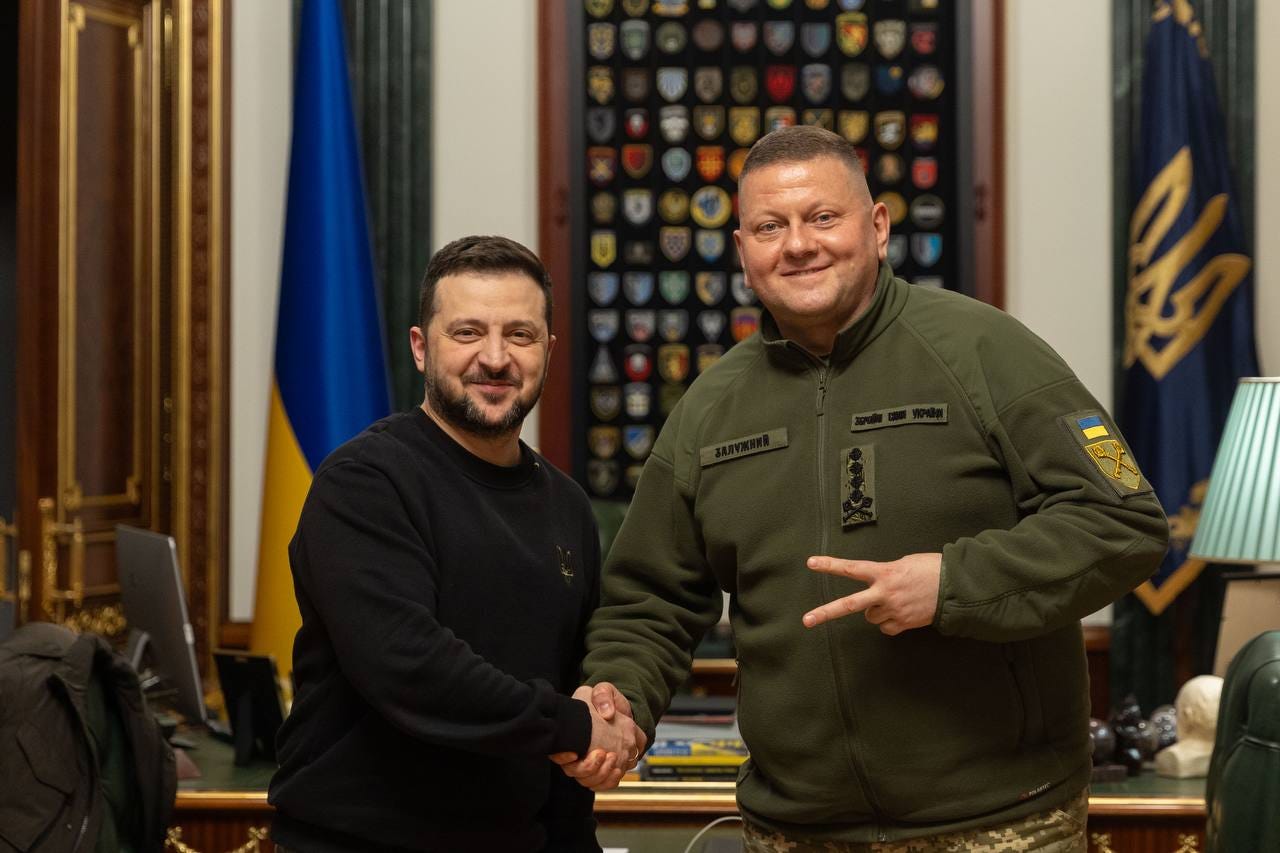
The dismissal was part of a reshuffle of Ukraine's military leadership, with many other positions also being changed. There are a lot of different reasons being thrown around for the shake-up (possibly amplified by Russian disinformation operations), from a necessary renewal to Zelenskiy being afraid of a political challenge from Zaloushnyi. The new commander-in-chief, Oleksandr Sykrskyi, faces some suspicion because of his background (he was born and trained in Russia).
If you're interested in the competence of these people, which I am absolutely not qualified to speak on, I found this piece quite interesting.
Ukrainian drones strike deep into Russian territory
Since the start of the year, Ukrainian intelligence services have claimed a number of strikes on Russian targets far behind the front, such as oil depots and drone factories. These strikes were mostly carried out using self-built long-range drones: Western countries’ guidelines that Ukraine not use Western weapons in Russian territory have motivated the Ukrainians to build their own long-range weapons.
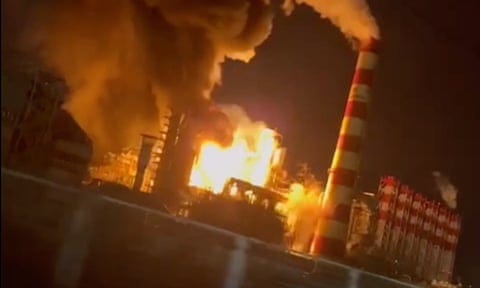
Also, Ukraine managed to sink two Russian warships in the Black Sea with naval drones (think remote-controlled, explosive jet skis). Ukraine claims to have sunk or damaged almost a third of Russia's Black Sea fleet, without having much of a navy itself, by using rockets and drones. Keeping the Russian fleet at bay has allowed Ukrainian grain to continue to be shipped over the Black Sea, despite Russia canceling the "Black Sea Grain Initiative" last July.
A video by Ukraine’s military intelligence service showing a drone attack on a Russian ship, accompanied by horrible music
Furthermore, Ukraine says it has downed a number of Russian planes in recent days, including a very valuable A-50 spy plane (the second of its kind this year). It's unclear how long it can continue to do this, with anti-aircraft missiles reportedly running low.
Bodies in Trenches
Note: I will write about the big contributions Ukrainian women are making to the war effort, both at and behind the front, in the future. For this issue, I will focus on the men, since they are directly impacted by conscription.
There's another thing that Ukraine is short on: Soldiers. The battlefield might change with the introduction of futuristic drones. But war remains, at its core, really one thing: A machine that consumes sons and fathers, never letting go of them, even if they are lucky enough to return home.
Ukrainian forces are vastly outnumbered along many points of the front line. And many of those fighting have been doing so almost non-stop for two years, with very little time to rest.
Initially, Ukraine had more volunteers than it could process. But about a year after the war started, the military needed to enforce conscription to keep up with the war’s increasing demand for manpower. Men aged 27–60 can get drafted into the military and are only allowed to leave the country in exceptional cases. {footnote: So do specifically educated women, although I am not sure whether this is being enforced at border checkpoints} A number of recruitment officers have become embroiled in corruption scandals. I've personally heard several stories about corrupt, arbitrary and brutal deliveries of "military tickets". I can't verify any of them, but it's certainly an issue being talked about.
At the end of 2023, the military said it needed 450'000 to 500'000 new recruits in 2024.
Now, a new mobilization bill, which is supposed to regulate mobilization in the coming years, is awaiting approval in parliament. The law doesn't directly correlate with the 500'000 number. It proposes a number of changes, some of which are formalities or common-sense things that should have been implemented a long time ago. But parts of the law are quite controversial and might be subject to change. Some of the key points currently are:
- lowering the age of conscription to 25
- establishing a minimum training period of 2 months
- introducing a minimum salary of $526 per month
- guaranteeing 15 days of leave per year
- removing previous military exemptions for employees of national security services
- exempting people with disabilities from military service
Since I first came to Kyiv in the summer of 2023, the Ukrainians I met were the ones not at the front. Most of them are a few years younger than 25. As you can see in the graphic below, they represent only a small part of the overall population.
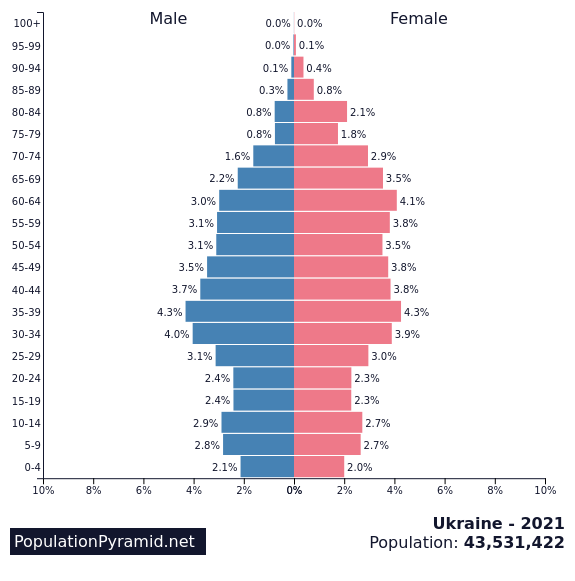
These people, at an age similar to mine, are now confronted with the prospect of being sent to the front. And they have no illusions about what awaits them. They know. This is not fucking 1914. A lot of young people have raised funds to equip their parents and friends on the frontlines. And they have all seen grainy footage of soldiers meeting their horrific demise and have heard stories of woefully under-equipped units dying in trenches.
According to Zelenskyi, the number of fallen soldiers is 31’0001. And it rises every day. It rises silently, without much media coverage. I imagine an ever-shrinking spreadsheet somewhere in Ukraine's Ministry of Defense with crossed-off entries representing men only remembered by their loved ones.
So many men have already fallen or are still fighting. They might find their way into the history books of future generations. Either as heroes who saved their homeland, or as tragic defenders who were abandoned by the world in their fight against a vastly more powerful enemy. I doubt that helps when you're being chased down by a silent drone, pounded by artillery and shot at with bullets.
So how do you even live your life with this fate awaiting you? Well, here are some examples. All of these people are in their early 20s.
- Maxim* turned into a patriot at the beginning of the war. He enlisted as a volunteer. Too many people were volunteering at that time; there wasn't enough capacity to take all of them. So Maxim was told that he would get a call soon. He never got the call, maybe they lost his number? When I met him 18 months later, his patriotism had faded. He would like to go abroad, as he had planned to do before the war. He doesn't want to die and doesn't trust the military's top command, which he sees as corrupt and incompetent. So he considered trying to escape, paying a bribe of a few thousand dollars to get an exemption, but decided it was too dangerous. Instead, he hopes to get around the draft in other ways.
- Artur recently began his new job as manager of a quite nice restaurant. His favorite dish is Dorado fillet with quinoa and top spinach. His father has been fighting for over a year. Part of his reason to enlist might have been to protect his son from the same fate. Yet Artur’s time might come too, and he says that he isn't "gonna dress up as a woman and go to Poland".

- Danylo, whom I met quite drunkenly at a university park and who’s reportedly a fantastic theater actor, is deeply scared of the front. It doesn’t make him proud, but he is scared to die. He told me so last September. When we talked on the phone around New Year's, he said that although his fear remains unchanged, he has accepted a fate that he sees as inevitable. That it was time to “take off the pink glasses and face reality”. That this war would go on for at least his 20s, maybe until his hypothetical children's 20s, and that he would do his part.
- Oleksiy* left Ukraine shortly before his 18th birthday, when he was still allowed to do so. He would have been assigned the position of tank driver and doesn't see himself at the front. He now travels through Europe, trying to find his place in this world, while still advocating for his country in his own way.
*names changed
These are but a few examples of young people trying to find their path through this violent fog of war. I met many more young men and women, each and every one brave in their own way, trying to carry on, clinging on to their mantra: "It is what it is".
Yet there's one thing that sometimes helps me smile. It's a secret. The world didn’t understand it. That’s why everyone thought Kyiv was going to fall within days when the war broke out.
The secret is:
Ukrainians are a little insane. In the best way possible :)
After you finish reading this, go watch the documentary "Winter on Fire" on Ukraine's Euromaidan Revolution 2013-14. I think it's on Netflix.
How did Putin, this awful man, this fucking ape, think these people were going to welcome him without real resistance?
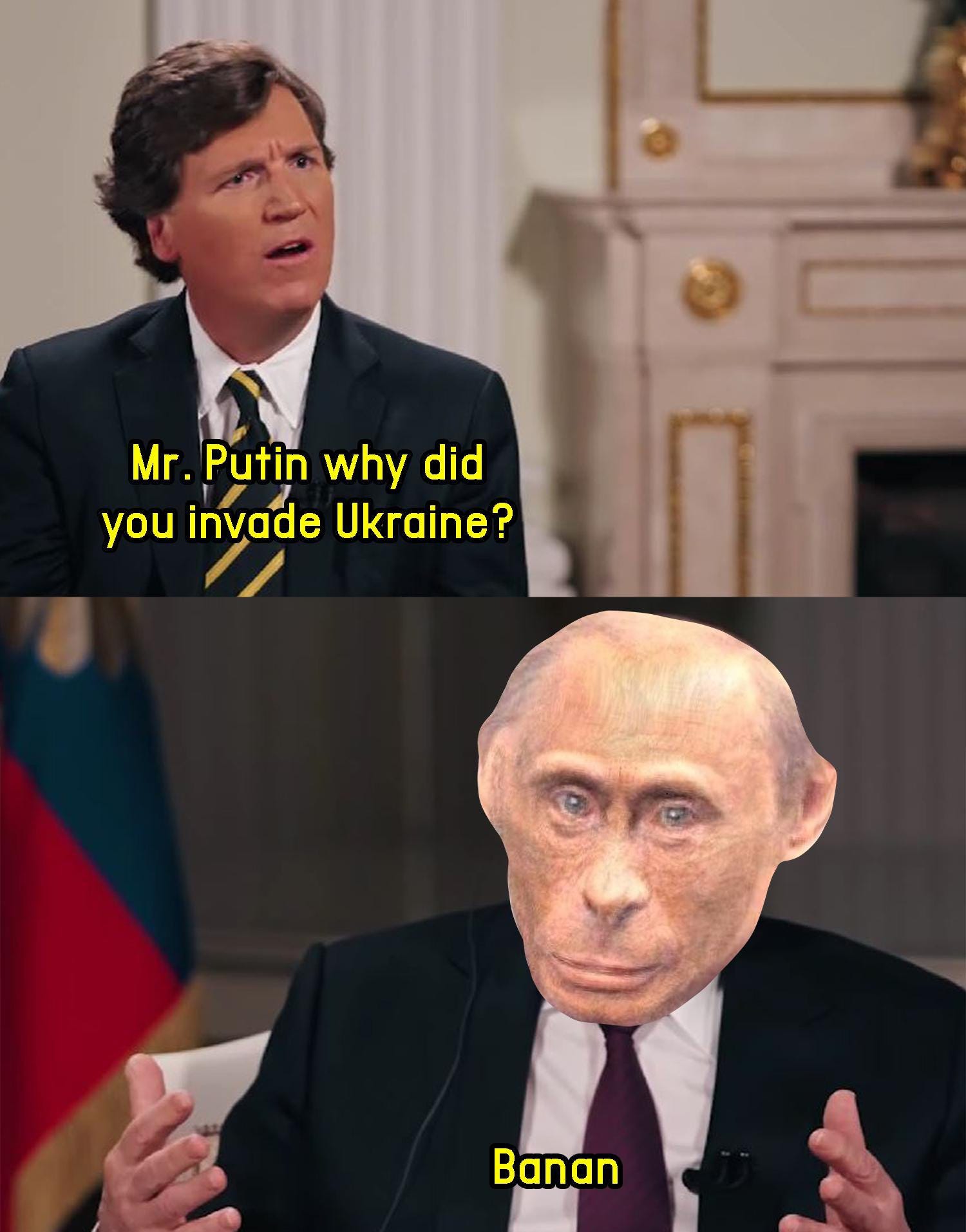
And now, look at Kyiv. This city, which in the first months of the war was a ghost town. And now this uneven city - for some reason built on top of three hills, with pavement bad enough to make Western feet trip at least once a day - is alive. Full of wonderful people. A lot of people I met talked about the amount of new places to eat, drink or chill. I asked Ukraine's wartime media center whether there was an actual growth of businesses in Kyiv. They told me, "Yeah, we think so, but we don't have the data". (I am awaiting responses from other authorities.)
Which leads to the question: Who the fuck opens a coffee shop in the middle of a war? I happen to have an answer for you.
His name is Evgeny. He’s one of the Ukrainian men who are allowed to leave their country, for the sad reason that his father died at the front a year ago.
Yet, what is he doing now? He is staying in Kyiv. And he opened a coffee shop. By sheer coincidence, he did so today. Right here.
And this is the first breakfast they served:

You should follow them on instagram :)
Day by day, month by month, year by year, this war will go on. Nobody knows how it will end. It will continue to change Europe and the world. And while it does, I will keep you informed with a monthly update. All you need to do is subscribe with your email below. It’s free, but you can support my work with a tip here.
Also, feel free to leave feedback or questions in the comments below :)
Any typos in this post are on purpose, actually
Correction: I intially wrote, that there are at least 42’000 names of fallen soldiers known. That was based on data form the ualosses.org project, which tracks deaths of civillians and soldiers alike. ↩
